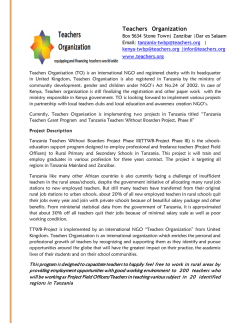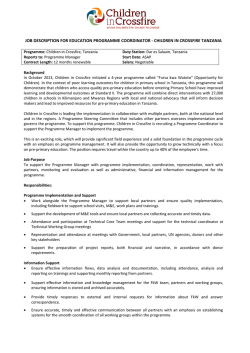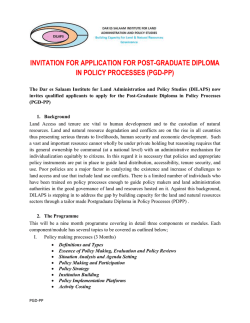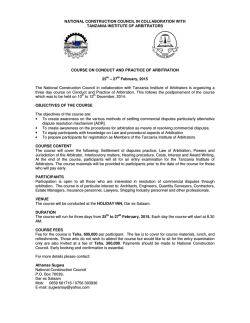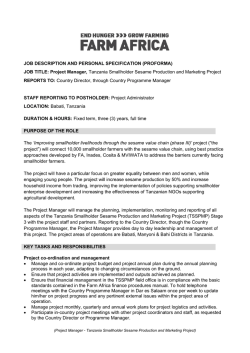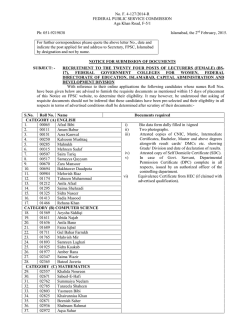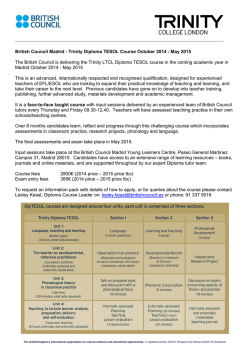
Education system Tanzania
Education system Tanzania The Tanzanian education system described and compared with the Dutch system Education system | Evaluation chart Education system Tanzania This document provides information about the education system of Tanzania. It also includes the Dutch comparison of qualifications obtained in Tanzania. Except where expressly stated otherwise and with the exception of images and illustrations, this publication is subject to the Creative Commons Attribution NonCommercial 3.0 Unported (CC BY-NC 3.0) Licence. For more information about the reuse of this publication please visit https://www.nuffic.nl/en/home/copyright. Education system Tanzania | EP-Nuffic | 1st edition December 2014 | version 1, January 2015 2 Education system | Evaluation chart Education system Tanzania Education system Tanzania L7 postgraduate Doctor of Philosophy (PhD) 2+ L6 Master (university education) undergraduate 1-2 L4 Bachelor (university education) Postgraduate Diploma (university education) 3-5 1 L4 Central Admissions System Advanced Certificate of Secondary Education (advanced secondary school) L5 L3 2 Certificate of Secondary Education (ordinary secondary school) Diploma / certificate (technical / vocational education) L3 2-3 L2 4 Primary Education L1 7 L0 Education level 0 Duration of education Click here to view a sample of the diploma Education system Tanzania | EP-Nuffic | 1st edition December 2014 | version 1, January 2015 3 Education system | Evaluation chart Education system Tanzania Evaluation chart The left side of the chart below lists the foreign degree, followed by the Dutch equivalent on the right along with the corresponding reference levels in the Dutch and European qualifications frameworks. Degree or qualification Dutch equivalent and NLQF level EQF level Certificate of Secondary Education (an A, B VMBO-T diploma 2 2 HAVO diploma 4 4 At least HAVO diploma 4 4 HBO bachelor’s degree 6 6 6 6 7/6 7/6 7 7 or C in at least 5 subjects) Certificate of Secondary Education (an A, B or C in at least 6 examination subjects plus the Advanced Certificate of Secondary Education with a principal pass for at least 1 subject Certificate of Secondary Education (A, B or C in at least 5 examination subjects plus the Advanced Certificate of Secondary Education with a principal pass for at least 2 subjects and a subsidiary pass for at least 1 subject Bachelor’s degree (3 years) or 2 years of WO Bachelor’s degree (4 years) HBO or WO bachelor’s degree Master’s degree (1 year) HBO master’s degree or WO bachelor’s degree Master’s degree (2 years) WO master’s degree NB • The information provided in the table is a general recommendation from which no rights may be derived. • NLQF = Dutch Qualifications Framework. EQF = European Qualifications Framework. • The evaluation of a foreign qualification in terms of the EQF/NLQF does not necessarily mean that all of the learning outcomes associated with these levels have been achieved. • Information on the Dutch equivalent qualifications is available in the Netherlands Education System. See: http://www.nuffic.nl/en/library/education-systemnetherlands.pdf Education system Tanzania | EP-Nuffic | 1st edition December 2014 | version 1, January 2015 4 Education system | Evaluation chart Education system Tanzania • The information regarding international study programmes at VMBO and MBO level is issued by SBB, the foundation for Co-operation on Vocational Education, Training and the Labour Market). Education system Tanzania | EP-Nuffic | 1st edition December 2014 | version 1, January 2015 5 Education system | Evaluation chart Education system Tanzania Introduction Tanzania gained independence from the United Kingdom in 1961. In 1964, the Republic of Tanganyika joined with the People's Republic of Zanzibar and Pemba to form the United Republic of Tanzania. The United Republic currently has over 45 million inhabitants. The education system is based around a 2-7-4-2-3+ structure. In other words: 2 years of pre-primary school, 7 years of primary school, 4 years of ordinary secondary school (ordinary level), 2 years of advanced secondary school (advanced level) and at least 3 years of higher education. The Ministry of Education and Vocational Training has general responsibility for the education system. Amongst other aspects, the Ministry is charged with quality assurance, research, monitoring and evaluation of primary and secondary education. In addition to the Ministry, various other parties are involved in the governance and monitoring of education services, such as the Prime Minister's Office, the Regional Administration and Local Government, various NGOs and individuals coordinated by the central government. The Ministry is also responsible for higher education at universities. Public universities are semi-autonomous and have the freedom to determine – amongst other aspects – their own curricula. They are also authorised to award academic degrees. Although the vice-president of the university is appointed by the institution itself, the president is appointed by the President of Tanzania. All universities, both public and private, operate under the supervision of the Tanzania Commission for Universities (TCU). The National Council for Technical Education (NACTE) is responsible for all technical and vocationally oriented secondary and higher education offered at non-university institutions. Compulsory education in Tanzania starts at the age of 7 and ends at age 14. The language of instruction for primary education is Kiswahili. However, the language of instruction for both secondary and higher education is English. The academic year runs from September to July. Education system Tanzania | EP-Nuffic | 1st edition December 2014 | version 1, January 2015 6 Education system | Evaluation chart Education system Tanzania Primary and secondary education Primary education is compulsory for children aged 7 to 14. Secondary education is divided into an ordinary secondary school level and an advanced secondary school level. The ordinary secondary school level is intended for the 14-17 age group, while the advanced secondary school level is intended for the 18-20 age group. Primary education lasts 7 years and ends with the Primary School Leaving Examination. However, this examination does not lead to a certificate. Pupils are admitted to secondary education or vocational training centres on the basis of their results. Secondary education comprises both an ordinary level and an advanced level. The ordinary level comprises forms 1 through 4, while the advanced level comprises forms 5 and 6. By the end of these levels, pupils take examinations for the Certificate of Secondary Education and Advanced Certificate of Secondary Education, respectively. Pupils to have achieved a satisfactory result for the Certificate of Secondary Education may then attempt to obtain an Advanced Certificate of Secondary Education. Secondary schools specialise in agriculture, commerce, home economics and technology. Pupils in forms 1-4 (ordinary level) study civics, English, Kiswahili, history, geography, physics, chemistry, biology and mathematics. Pupils in forms 5 and 6 (advanced level) specialise in commerce, arts and social sciences or natural sciences. They also take general studies. Pupils to have obtained an Advanced Certificate of Secondary Education are eligible for admission to a higher education institution. Examinations for the Certificate of Secondary Education and Advanced Certificate of Secondary Education are administered nationally. In order to obtain the Certificate of Secondary Education, students must take examinations in at least 7 subjects. Examination results are expressed in letters, whereby the letters A through D represent a passing grade. In terms of level, the Certificate of Secondary Education is comparable in the Netherlands to a VMBO-T (theoretische leerweg) diploma, providing at least 5 subjects have been graded with an A, B or C. In order to obtain an Advanced Certificate of Secondary Education, pupils are generally required to study 3 subjects. Examination results are expressed in letters, whereby the letters A through E represent a passing grade (principal pass), S represents a subsidiary pass (insufficient for a pass at ACSE level, but adequate for a pass at CSE level) and F represents a fail. Education system Tanzania | EP-Nuffic | 1st edition December 2014 | version 1, January 2015 7 Education system | Evaluation chart Education system Tanzania In terms of level, the Certificate of Secondary Education with an A, B or C for at least 6 examination subjects plus an Advanced Certificate of Secondary Education with a principal pass for at least 1 subject is comparable in the Netherlands to a HAVO diploma. In terms of level, the Certificate of Secondary Education with an A, B or C for at least 5 examination subjects plus an Advanced Certificate of Secondary Education with a principal pass for at least 2 subjects and a subsidiary pass for at least 1 subject is comparable to at least a HAVO diploma in the Netherlands. In addition to the option of transferring to advanced secondary education, pupils at ordinary secondary school level may also continue studying within secondary vocational education. In Tanzania, secondary vocational education is offered at various vocational training centres. These institutions offer study programmes in various technical and vocational fields, for instance programmes for students who want to become carpenters, electricians or plumbers. These programmes generally conclude after 2 or 3 years with traditional examinations that lead to various diplomas or certificates. Education system Tanzania | EP-Nuffic | 1st edition December 2014 | version 1, January 2015 8 Education system | Evaluation chart Education system Tanzania Admission to higher education In order to be admitted to both public and private universities, prospective students must register via the Tanzania Commission for Universities' Central Admissions System. Students seeking to enrol in study programmes offered by the other private higher education institutions may apply directly to the relevant institution. In order to be admitted to a university bachelor's programme, prospective students must have a Certificate of Secondary Education with at least 5 passes, plus an Advanced Certificate of Secondary Education with principal passes in at least 2 subjects and a subsidiary pass in 1 subject. More stringent requirements may apply, depending on the chosen specialisation. Higher education Higher education is offered at 28 universities, 19 university colleges and various training colleges and institutes. The higher education system is divided into non-university level and university level studies. The number of non-university level institutions (technical, vocational and professional schools) has increased significantly over the past few years. These institutions are overseen by the responsible ministries. They are authorised to issue various qualifications, ranging from certificates, diplomas and advanced diplomas to postgraduate diplomas. These qualifications offer access to bachelor's and master's programmes, depending on their level. Universities and university colleges offer both academic and higher professional education. These institutions offer degree programmes and non-degree programmes, leading to an academic degree or other qualification. These comprise the bachelor's, master's and doctorate degree; the non-degree qualifications comprise certificates and diplomas. The universities are authorised to independently award academic degrees. The structure of the higher education system is divided into an undergraduate and postgraduate phase. Undergraduate education leads to attainment of a bachelor's degree. Postgraduate education leads to attainment of a master's degree or doctorate degree, or postgraduate diploma. Education system Tanzania | EP-Nuffic | 1st edition December 2014 | version 1, January 2015 9 Education system | Evaluation chart Education system Tanzania University and higher professional education Tanzania's first higher education institution was established in 1961, in the form of a University of London-affiliated college. The institution initially consisted of a single law faculty. In 1963, the college became part of the University of East Africa, along with the Makerere University College in Uganda and Nairobi University College in Kenya. At the time, the Tanzanian institution went by the name University College Dar es Salaam. Following the closure of the University of East Africa in 1970, University College Dar es Salaam became an independent national university under the name University of Dar es Salaam. Bachelor Most bachelor's programmes have a duration of 3 years. Programmes in the disciplines of pharmacy, nursing, veterinary science and engineering have a duration of 4 years. The medicine programmes have a duration of 5 years. In terms of level, a Bachelor degree following a nominal 3-year study programme is comparable in the Netherlands to an HBO bachelor's degree or 2 years of university education (WO), depending on the content and type of study. In terms of level, a Bachelor degree following a nominal 4-year programme is comparable in the Netherlands to an HBO or WO bachelor's degree, depending on the content and type of study. Master The nominal duration of a master’s degree programme is 1 or 2 years. To gain entry to a master’s degree programme, students must hold a bachelor's degree. In most cases, these study programmes continue the specialisation of the bachelor’s degree obtained previously. In principle, master’s programmes conclude with a thesis. In terms of level, a Master degree following a nominal 1-year study programme is comparable in the Netherlands to an HBO master's degree or WO bachelor's degree, depending on the content and type of study. Education system Tanzania | EP-Nuffic | 1st edition December 2014 | version 1, January 2015 10 Education system | Evaluation chart Education system Tanzania In terms of level, a Master degree following a nominal 2-year programme is comparable in the Netherlands to a WO master's degree. Doctor of Philosophy (PhD) Following successful completion of a master's programme, candidates are eligible to pursue the title of Doctor of Philosophy (PhD). In order to qualify for a doctorate, candidates must have completed at least 2 years of study and research following attainment of their master's degree, and written a dissertation. Postgraduate Diploma Postgraduate diploma programmes continue at the level of completed bachelor's programmes, leading to a higher level of education. The nominal duration of these programmes is 9 to 12 months. The programmes do not conclude with a thesis. Education system Tanzania | EP-Nuffic | 1st edition December 2014 | version 1, January 2015 11 Education system | Evaluation chart Education system Tanzania Assessment systems Examination results for the Certificate of Secondary Education are expressed in letters, whereby the letters A through D represent a passing grade. Examination results for the Advanced Certificate of Secondary Education are also expressed in letters, whereby the letters A through E represent a passing grade (principal pass), S represents a subsidiary pass and F represents a fail. Certificate of Advanced Certificate of Description Definition Secondary Education Secondary Education (CSE) (ACSE) A A Excellent Excellent B B Very Good Very good C C Good Good D D Satisfactory More than satisfactory E Poor Satisfactory F Fail Unsatisfactory S Subsidiary Pass Insufficient for a pass at ACSE F level, but adequate for a pass at CSE level. Higher education bachelor's degrees also specify a class. Letter Description Classification A Excellent First Class B+ Very Good Upper Second Class B Good Lower Second Class C Satisfactory Pass D Fail E Fail Education system Tanzania | EP-Nuffic | 1st edition December 2014 | version 1, January 2015 12 Education system | Evaluation chart Education system Tanzania Qualification frameworks In 2009, the Ministry of Education and Vocational Training and the Tanzania Commission for Universities initiated the establishment of an overarching national qualifications framework, the Tanzania Qualifications Framework (TzQF). The framework is yet to be implemented at the time of writing. The definitive proposal for this TzQF is featured on the following website: www.ideaphd.net/files/8113/5773/7871/TCU_NQF_Final_Report_March_2010.pdf Qualifications for the technical and vocationally oriented education system are currently not linked to the Technical and Vocational Education and Training (TVET) Qualifications Framework applied by the National Council for Technical Education (NACTE), the body responsible for technical and vocationally oriented education at non-university institutions. These qualifications are referred to as the National Technical Awards (NTA). Each NTA qualification includes a detailed description of the required competencies. For further information on the TVET Qualifications Framework, see the website of the National Council for Technical Education (NACTE): www.nacte.go.tz/?id=2&page=cat&source=Qualification%20Framework Quality assurance and accreditation In accordance with the provisions of Act No. 7 (2005), the Tanzania Commission for Universities (TCU) is responsible for the registration and monitoring of institutions and the accreditation and quality assurance of study programmes and qualifications at both public and private universities. You can consult the TCU website to find out whether a specific Tanzanian university or study programme has been accredited: www.tcu.go.tz Other secondary and higher education institutions are under the supervision of the National Council for Technical Education (NACTE). For an overview of all accredited and registered institutions, see the NACTE website: www.nacte.go.tz/index.php Education system Tanzania | EP-Nuffic | 1st edition December 2014 | version 1, January 2015 13 Education system | Evaluation chart Education system Tanzania International treaties Tanzania has no international education agreements with other countries. Addresses www.moe.go.tz Website of the Ministry of Education and Vocational Training. www.tcu.go.tz/?view=featured Website of the Tanzania Commission for Universities (TCU). www.nacte.go.tz/index.php Website of the National Council for Technical Education (NACTE). www.veta.go.tz/index.php/en Website of the Vocational Education and Training Authority (VETA). www.s-bb.nl Website of SBB, the Foundation for Co-operation on Vocational Education, Training and the Labour Market. Composition of file Participation in secondary education requires a Certificate of Secondary Education and an Advanced Certificate of Secondary Education. Pupils to have completed a higher education programme will be presented with a diploma, generally accompanied by an overview of the relevant subjects and study and examination results. List of higher education institutions www.tcu.go.tz Website of the Tanzania Commission for Universities (TCU) featuring an overview of accredited universities and study programmes. www.nacte.go.tz/index.php Website of the National Council for Technical Education (NACTE), featuring an overview of accredited and registered secondary and higher professional education institutions. Education system Tanzania | EP-Nuffic | 1st edition December 2014 | version 1, January 2015 14 Education system | Evaluation chart Education system Tanzania Certificate of Secondary Education Education system Tanzania | EP-Nuffic | 1st edition December 2014 | version 1, January 2015 15 Education system | Evaluation chart Education system Tanzania Advanced Certificate of Secondary Education Education system Tanzania | EP-Nuffic | 1st edition December 2014 | version 1, January 2015 16 Education system | Evaluation chart Education system Tanzania Bachelor - diploma Education system Tanzania | EP-Nuffic | 1st edition December 2014 | version 1, January 2015 17 Education system | Evaluation chart Education system Tanzania Bachelor – transcript (page 1) Education system Tanzania | EP-Nuffic | 1st edition December 2014 | version 1, January 2015 18 Education system | Evaluation chart Education system Tanzania Bachelor – transcript (page 2) Education system Tanzania | EP-Nuffic | 1st edition December 2014 | version 1, January 2015 19 Education system | Evaluation chart Education system Tanzania Master – diploma Education system Tanzania | EP-Nuffic | 1st edition December 2014 | version 1, January 2015 20 Education system | Evaluation chart Education system Tanzania Master – transcript Education system Tanzania | EP-Nuffic | 1st edition December 2014 | version 1, January 2015 21 Education system | Evaluation chart Education system Tanzania Qualification Tanzania Certificate of Secondary Education • general secondary education diploma • grants access to advanced secondary school level in Tanzania This qualification is comparable to a VMBO-T diploma in the Netherlands, providing a final result of A, B or C has been obtained for at least 5 subjects. NB: This information is a general recommendation from which no rights may be derived. Education system Tanzania | EP-Nuffic | 1st edition December 2014 | version 1, January 2015 22 Education system | Evaluation chart Education system Tanzania Qualification Tanzania Advanced Certificate of Secondary Education • general secondary education diploma • grants access to all higher education programmes in Tanzania This qualification is comparable to at least a HAVO diploma in the Netherlands, providing the Certificate of Secondary Education is graded with an A, B or C for at least 5 examination subjects and the Advanced Certificate of Secondary Education is graded with a principal pass for at least 2 subjects and a subsidiary pass for at least 1 subject. NB: This information is a general recommendation from which no rights may be derived. Education system Tanzania | EP-Nuffic | 1st edition December 2014 | version 1, January 2015 23 Education system | Evaluation chart Education system Tanzania Qualification Tanzania Bachelor’s degree (3 years) • first cycle higher education diploma • grants access to master’s programmes in Tanzania This qualification is comparable to an HBO bachelor's degree or 2 years of university education (WO), depending on the content and type of study. NB: This information is a general recommendation from which no rights may be derived. Education system Tanzania | EP-Nuffic | 1st edition December 2014 | version 1, January 2015 24 Education system | Evaluation chart Education system Tanzania Qualification Tanzania Bachelor degree (4 years) • first cycle higher education diploma • grants access to master’s programmes in Tanzania This qualification is comparable to an HBO or WO bachelor's degree in the Netherlands, depending on the content and type of study. NB: This information is a general recommendation from which no rights may be derived. Education system Tanzania | EP-Nuffic | 1st edition December 2014 | version 1, January 2015 25 Education system | Evaluation chart Education system Tanzania Qualification Tanzania Master’s degree (1 year) • second cycle higher education diploma • grants access to PhD programmes in Tanzania This qualification is comparable to an HBO master's degree or WO bachelor's degree in the Netherlands, depending on the content and type of study. NB: This information is a general recommendation from which no rights may be derived. Education system Tanzania | EP-Nuffic | 1st edition December 2014 | version 1, January 2015 26 Education system | Evaluation chart Education system Tanzania Qualification Tanzania Master's degree (2 years) • second cycle higher education diploma • grants access to PhD programmes in Tanzania This qualification is comparable to a WO master's degree in the Netherlands. NB: This information is a general recommendation from which no rights may be derived. Education system Tanzania | EP-Nuffic | 1st edition December 2014 | version 1, January 2015 27
© Copyright 2026
